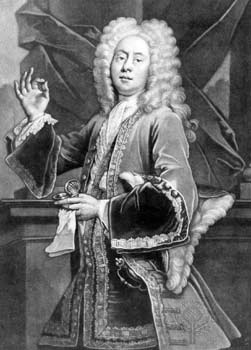
Colley Cibber was the most famous and glittering theatrical figure of early eighteenth century London. At the height of his powers, as an actor, a dramatist, and theatre manager, he was a major celebrity. His name was on everyone’s lips, celebrated in every broadsheet in the capital. Like Lord Foppington, his most famous theatrical creation, he would dress in sublime, over-the-top Georgian splendour. It is said that Foppington’s wig was so large and magnificent that it had to be carried around in its own sedan chair.
Cibber himself was the target of every joke and ribaldry in the Town, and yet he was indescribably popular. But not universally so; the intellectual minority, overwhelmingly Tory, hated his effortless popularity, his over-weaning confidence, and despised his self-seeking vanity and sycophancy – and of course his Whig politics. He, on the other hand, cared nothing for their barbs and stings; he knew he was a success – and on which side his bread was buttered.
But while this dazzling dandy was flaunting his worldly success, gliding effortlessly among the great and the good, en route to becoming the most untalented Poet Laureate in history, his youngest daughter and her small child were starving to death in the streets of London.
What brought about this schism between Cibber and his daughter Charlotte? Was it her penchant for playing male travesti roles on stage? Her theatrical cross-dressing spilling over into her private life? Her biting satirical parodies of her own father’s famous stage roles? Her refusal to bow down to the sexual conventions of the day? Or was she merely a pawn, sacrificed in a larger game of politics, which resulted in two hundred years of censorship of the English stage?
One interpretation of this fascinating story is told in my play, Travesti, which you can read here.
Although largely forgotten today, Colley Cibber stood out in the theatre of the early eighteenth century. Rising from apprentice actor to become (like David Garrick some 30 years later) actor-manager in charge of Drury Lane, Cibber was actor, author, playwright and celebrity. Through his ability to flatter and ingratiate himself with the rich and powerful, Cibber eventually rose to become Poet Laureate. But his talents for hypocrisy and self-promotion were never inherited by his youngest daughter, Charlotte, who despite following in her father’s theatrical footsteps, insisted on ploughing her own furrow, and flying in the face of his conventional sensibilities.
Charlotte became notorious not only for playing male travesti parts on the stage, but for carrying her cross-dressing into her private life. Suspicions about her immoral behaviour, together with her increasingly flagrant parodies of her famous father, led Cibber to disown her. Cut off from her chosen profession, and the love and support of a family, Charlotte (with her daughter Kitty) was condemned to a hand to mouth existence for the rest of her life, and eventually died in poverty.
The comic and tragic events of Charlotte's life - her defiance of convention in the face of her father's embarrassment and anger, and her inevitable fall from his favour - were played out against a sometimes surreal and distinctly non-contemporary picture of the eighteenth century. When prevented from appearing on the London stage by the machinations of her powerful father and his political friends, Charlotte resorted to running a puppet theatre, which continued to satirise the powerful figures of the day (including her father). When this failed, she became by turns a shopkeeper, a pie maker, a gardner - in fact anything that would save her and her daughter from starvation.
Her downfall may be seen to have started with her unfortunate marriage to the lead violinist of the Drury Lane orchestra, Richard Charke. Charke was ruthlessly ambitious, and saw Charlotte as the route to her father's favours and fortune. Aged seventeen, she fell in love with the romantic musician, and they were married. In doing so, Charlotte became Richard Charke's 'property', and all her income from her stage performances became his. Sadly, her money was not sufficient to pay for Charke's licentious lifestyle of gambling and womanising, and (it is said) having sold her valuable stage costumes to pay yet another gambling debt, he left her and his young daughter, Kitty.
Charke's excesses couldn't last, and he eventually decided to flee from his creditors, and his latest lover, to the safety of the West Indies. His arrival there was recorded in the book, 'Revels in Jamaica' by Richardson Wright as follows:
'In 1735, Henry Moore, later to become Lieutenant Governor of Jamaica and Governor of New York, arrived home. A native of the island, being born at Vere, he was sent abroad to be educated. After studying at Leyden, he took the usual grand tour, travelled though France, Italy and a considerable part of Germany. To Jamaica he brought with him a band of musical performers, the principal of whom were the famous Richard Charke, Colley Cibber’s son-in-law, and an Italian named Creponi.'
And, even though I didn't know it at the time, that was the starting point for the story of Scartato.